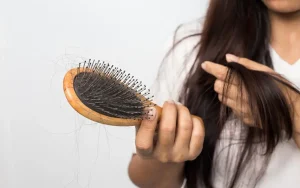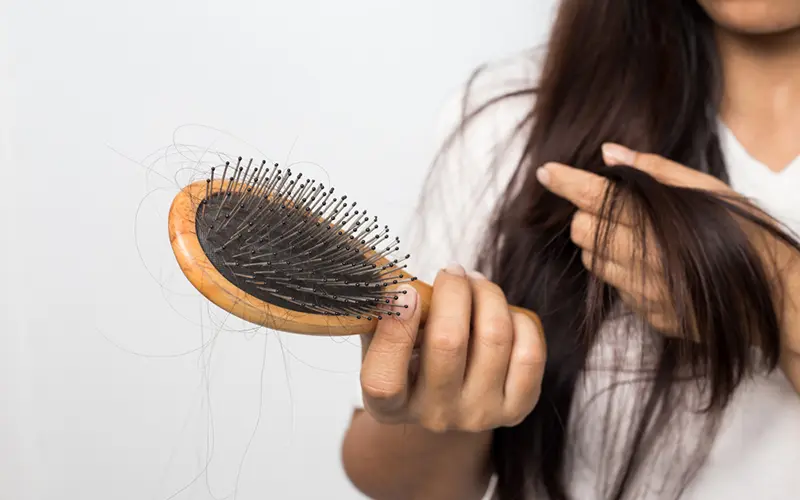Hair loss can be alarming, whether it happens gradually or suddenly. If you’ve been asking yourself, “Why am I losing hair?” you’re not alone. Understanding the Causes of Hair Loss is the first step toward finding a solution that works for you.
Common Causes of Hair Loss
Understanding the root of your hair loss starts with exploring the most frequent triggers. Below are some of the most well-documented and researched Causes of Hair Loss that affect both men and women.
1. Genetics (Androgenetic Alopecia)
One of the most common Causes of Hair Loss is genetics. Known as male or female pattern baldness, this type of hair loss is hereditary and often starts gradually with thinning at the crown or hairline.
2. Hormonal Changes
Hormonal shifts—such as those during pregnancy, menopause, or thyroid imbalances—can also trigger hair loss. These changes disrupt the natural growth cycle, making them a key factor among the Causes of Hair Loss in women and men alike.
Recommended Products: Medusa Cleaners
3. Stress and Emotional Shock
Physical or emotional stress can shock the hair follicles, pushing them into a resting phase. This condition, called telogen effluvium, is temporary but significant. Among lifestyle-related Causes of Hair Loss, stress is one of the most overlooked.
4. Nutritional Deficiencies
Lack of essential nutrients like iron, protein, biotin, or vitamin D can weaken hair and lead to shedding. Poor diet is a preventable entry on the list of Causes of Hair Loss and often improves with supplementation and better eating habits.
5. Medical Conditions and Medications
Autoimmune diseases like alopecia areata, scalp infections, or chronic illnesses can directly affect hair health. Additionally, medications for cancer, high blood pressure, depression, and more are recognized Causes of Hair Loss.
6. Hair Care Habits
Tight hairstyles, harsh chemical treatments, and frequent heat styling can damage follicles and cause breakage. These habits are avoidable Causes of Hair Loss and can be reversed by adopting gentler hair care routines.
7. Aging
As we age, hair naturally becomes thinner and less dense. This gradual process is one of the unavoidable Causes of Hair Loss, often managed with volumizing products or topical treatments like minoxidil.
Recommended Products: Medusa Tonics
8. Postpartum Hair Loss
Many women experience hair shedding a few months after giving birth. This condition, caused by a sudden drop in estrogen levels, is temporary but noticeable. It’s one of the hormonal Causes of Hair Loss that typically resolves within a year.
9. Environmental Factors
Pollution, UV radiation, and exposure to toxins can weaken hair shafts and follicles over time. These external elements are less obvious but real Causes of Hair Loss, particularly in urban areas.
10. Overuse of Hair Products
Heavy use of gels, sprays, and other styling products can build up on the scalp and clog follicles, eventually leading to hair thinning or breakage. Misuse of such products is among the preventable Causes of Hair Loss.
11. Rapid Weight Loss or Fad Diets
Dramatic weight changes and restrictive diets can shock the body and disrupt hair growth. These nutrition-related disruptions are underestimated Causes of Hair Loss that often catch people by surprise during major body transformations.
Recommended Article:
Conclusion
Losing hair can be distressing, but identifying the underlying reason makes it easier to take the right action.
Whether it’s genetics, stress, hormones, or hair care habits, knowing the Causes of Hair Loss empowers you to seek proper treatment, adjust your lifestyle, and support healthier hair growth in the long run.
FAQs
1. Can hair loss caused by genetics be reversed?
Genetic hair loss is usually permanent, but treatments like minoxidil and finasteride can slow it down and sometimes promote regrowth.
2. How long does stress-related hair loss last?
Stress-induced hair loss typically lasts a few months and improves once the stress is managed and the hair follicles recover.
3. Should I see a doctor if my hair loss is sudden or patchy?
Yes, sudden or patchy hair loss may indicate an underlying medical condition and requires professional evaluation for proper diagnosis and treatment.







